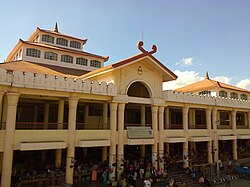Ima Keithel
neighbourhood in Imphal West, Manipur, India From Wikipedia, the free encyclopedia
Ima Keithel (English: Mothers' Market), also known as Nupi Keithel (English: Women's Market), or Khwairamband Keithel (English: Khwairamband Market[1]), is a market in the middle of Imphal in the Indian state of Manipur.[2][3] It is the only market in the world run entirely by women.[2][3][4][5][6][7][8][9] Men are not allowed to sell anything.[10] The Manipur Government has announced that the male shopkeepers will be punished if their shops are found inside the market.[10]


Ima Keithel
Mothers' Market, Women's Market | |
|---|---|
Neighbourhood | |
 One of the three buildings of the Ima Keithel (Women's Market). | |
| Nickname: Queen of Markets | |
| Coordinates: 24.808°N 93.935°E | |
| Country | India |
| State | Manipur |
| District | Imphal West |
| Languages | |
| • Colloquial | Meitei |
| Time zone | UTC+5:30 (IST) |
| PIN | |
| Management | Ima Keithel Union |
The market has around 5000-6000 shopkeepers. Women sell many kinds of things, like vegetables, clothes and many others. These are mostly local made of the state. The market was established in the sixteenth century AD. It has three large buildings. These are named after the three goddesses of Meitei religion. The goddesses are Leimarel Sidabi, Emoinu and Phouoibi.[1][2][3][11]
Ima Keithel is a perfect example of the long-lasting tradition of business management done by women in Manipur. Traditionally, Meitei women always enjoyed high status in the economy of the society. Women lead the trade and commerce in food and vegetables, household things and clothes in Manipuri society.[12] In history, it is the symbol of the empowerment and the leadership prospects of women in Manipur.[13]
The market was established in the 16th century AD. During that time, the Lallup system (forced labor system) began in 1533 AD. The men had to either join the army or serve the kingdom elsewhere far from their homes. At those times, women supported their their families. They did everything that men had used to do. Women did everything from farming to making clothes. Finally, they sold many things at the market. The market was one of the most important permanent markets in the kingdom until the 20th century.[2][14]
The market is run by a group of shopkeepers. It sets many traditional rules. According to it, women who marry only once in a lifetime are allowed to set up shops in the market. The shopkeepers include divorced women and widows. Many of them were the victims of the militancy in Manipur. Most of the women in the market are between 45 and 70 years old. The governing group regulates a system for lending money to women traders.[15]
Seamless Wikipedia browsing. On steroids.